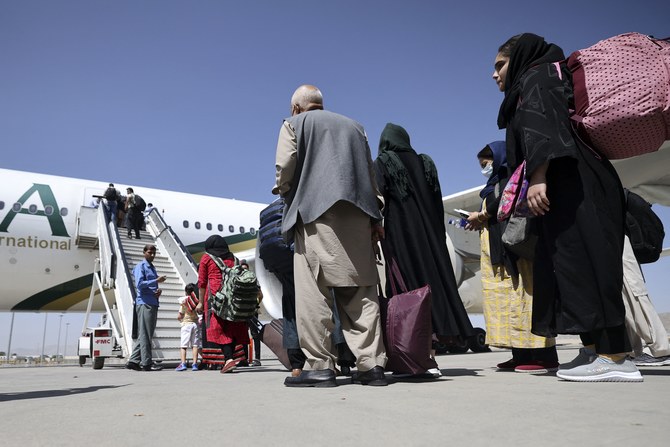KABUL: Afghan citizens and government officials said on Saturday they are hopeful Pakistan International Airlines (PIA) would soon resume its Kabul operations at the same cheaper fares it had offered before the Taliban took control of Afghanistan.
PIA resumed special flights from Kabul to the Pakistani capital, Islamabad, after the Taliban seized power in mid-August, and was a lifeline for many Afghans trying to flee the new regime, economic crisis or seek treatment in Pakistan, as they used to before.
But with most airlines no longer flying to Afghanistan, tickets for PIA flights have spiraled out of the reach of most Afghans, selling for as much as $2,500, according to travel agents in Kabul, compared with $120-$150 before the Taliban takeover.
Earlier this week, the Taliban transportation ministry issued a statement ordering the airline to “adjust the price of tickets for Kabul-Islamabad flights to the ticket standard set before the victory of the Islamic Emirate.” Otherwise “they will not be permitted to run their operations from Kabul airport.”
Following the statement by the Afghan transportation ministry, the PIA said it had suspended flights to Kabul over the “unprofessional attitude” of Taliban authorities.
“We hope PIA would understand and act according to the demand of Islamic Emirate Transport and Aviation Ministry,” Bilal Karimi, spokesman and member of the Taliban cultural commission, told Arab News on Saturday.
“What we are looking is to provide facilities to the ordinary Afghans who want to go to Pakistan, but they don’t have the budget to take flights.”
Ordinary Afghans are also hopeful the flights would soon be available and at affordable fares. Some need to go to Pakistan for lifesaving treatment that in many cases is not possible in Afghanistan, where health care infrastructure is largely fragile and inadequate for more complex medical interventions.
Abdul Ali Hussaini arrived in Kabul last week to bring his injured brother to Pakistan for urgent surgery after a deadly Daesh attack in the northern city of Kunduz on Oct. 8.
“I brought my brother to Kabul after the attack occurred, he is in emergency hospital. The doctors told me that for further treatment he should be transferred to Pakistan,” he told Arab News. “The suspension of the flights and also the high rate of tickets is a problem. We hope that the flights would resume and we would be able to take tickets in a cheaper price.”
Ataullah, 35, arrived in Kabul from Helmand province to travel with his leukemia patient mother for urgent treatment in Pakistan.
“I was asked $2,500 for each ticket,” he said, “I tried very hard to get my mother to Pakistan as soon as possible.”
“I do not know what to do. I expect a miracle.”
Mohammad Rashad from Kabul said he had received a scholarship from an Italian university but had been unable to travel as PIA’s flight prices were impossibly high.
“I have 15 days to go to Islamabad and from there travel to Italy,” the 26-year-old told Arab News. “I will miss this opportunity.”
Sayed, who works for a foreign agency in Afghanistan, wants to leave the country with his family is now trying to reach Islamabad. Still, the blocking of Pakistan Airlines flights to Kabul has posed a serious challenge to him.
“One of the embassies operating in Islamabad has sent my family and me our visas. They asked me to come to Pakistan within a week,” he said. “The delay in my trip to Pakistan has now become a major problem for us and has multiplied my security fears here in Kabul.”
While PIA has earlier said its Afghanistan operations are “not very lucrative financially” as it faces “difficult circumstances” at Kabul airport, some Afghan experts say high demand has allowed the carrier to impose skyrocketing fares.
“Demand for travel to Islamabad has increased,” Sayed Massoud, economics professor from Kabul University, told Arab News. “Everyone is trying to get to Islamabad as soon as possible and from there to another place.”
“Pakistan Airlines is trying to monopolize flights to Islamabad to make more money,” he said.
While PIA has not announced whether and when it is going to resume its Afghanistan flights, the airline’s representative in Kabul, Ahmad Salim Rohani, said he is hopeful it would happen soon return to its operations with more affordable fares.
“Once the flights resume,” he said, “we hope that the tickets would be at a lower price.”
















